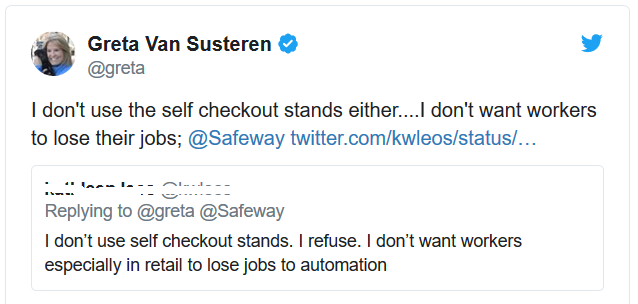The Lesson of the Spoons
In a story beloved by economists it’s said that Milton Friedman was once visiting China when he was shocked to see that, instead of modern tractors and earth movers, thousands of workers were toiling away building a canal with shovels. He asked his host, a government bureaucrat, why more machines weren’t being used. The bureaucrat replied, “You don’t understand. This is a jobs program.” To which Milton responded, “Oh, I thought you were trying to build a canal. If it’s jobs you want, you should give these workers spoons, not shovels!”
A funny story but one I was reminded of by Greta van Susteren’s not so funny tweet.

Bear in mind that Van Susteren has 1.2 million followers and, according to Forbes, is the 94th most powerful woman in the world.
Of course, there is something odd about using advanced technology to do a job that could be done by millions of immigrants who would be quite happy for the work, but Van Susteren is also against immigration.
Is there anything to be said for banning automation in low-skilled work? Let’s be charitable and assume that there is a problem with not enough work for low-skill workers. It’s unlikely that the best way to address this problem is by banning improvements in productivity. Which sectors are to be artificially restrained and by how much? Should fast checkout workers be banned? Should we prevent customers from walking the aisles and filling their own shopping carts? Remember, self-selection of goods was also once an innovation. As Friedman pointed out, it’s all too easy to reduce productivity.
To the extent that low-skill workers can’t find work (i.e. ZMP workers) the appropriate policy is a wage subsidy as Nobelist Edmund Phelps has suggested (see also the MRU video and Oren Cass on wage subsidies). A wage subsidy is better targeted than the Luddite smashing of machines and because it doesn’t prevent productivity from growing it makes for greater wealth to support the subsidy.